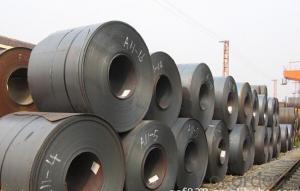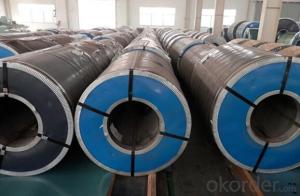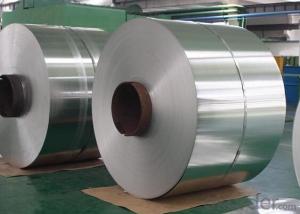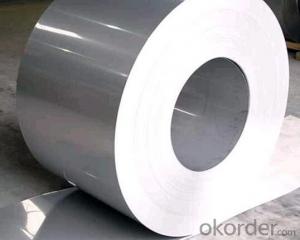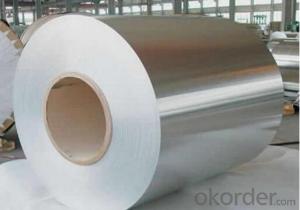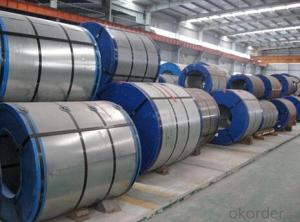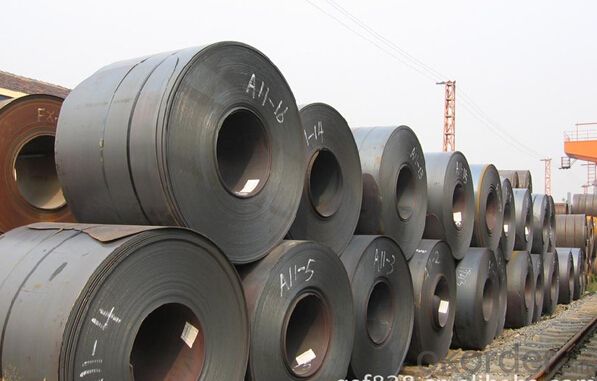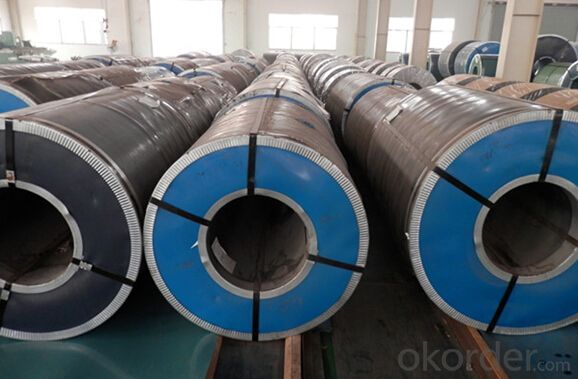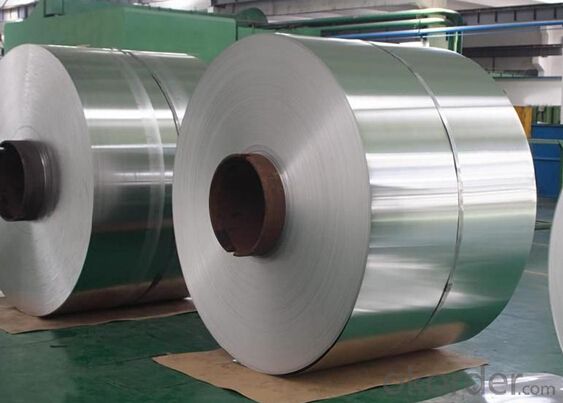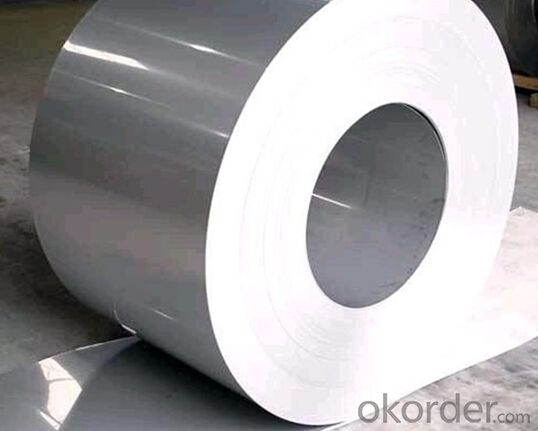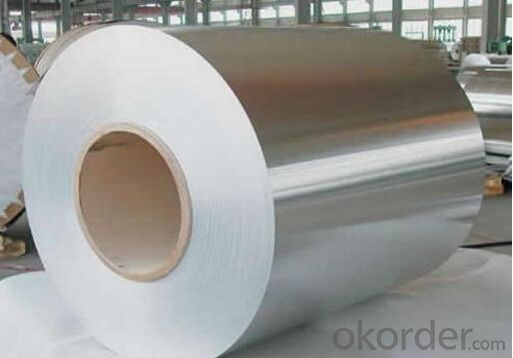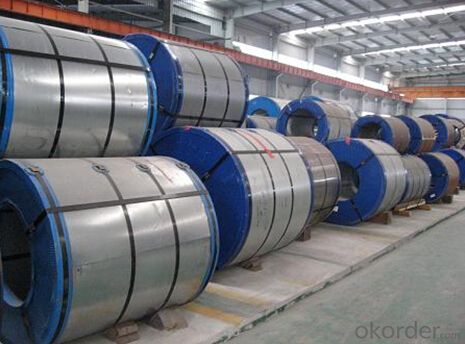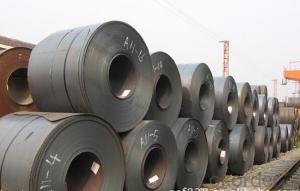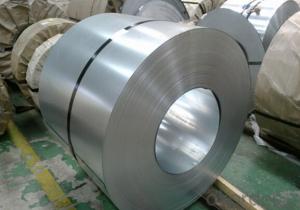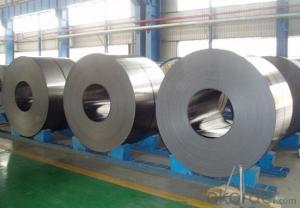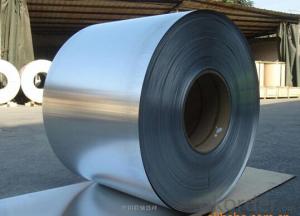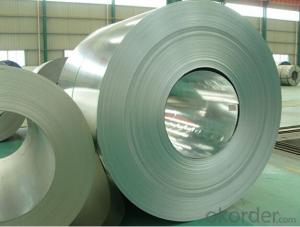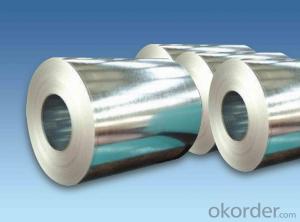Grade EN10346- DX53D+Z Galvanized Steel Coil
- Loading Port:
- Tianjin
- Payment Terms:
- TT OR LC
- Min Order Qty:
- 3 m.t.
- Supply Capability:
- 10000 m.t./month
OKorder Service Pledge
OKorder Financial Service
You Might Also Like
Specification
Grade EN10346- DX53D+Z Galvanized Steel Coil
Specification of the Grade EN10346- DX53D+Z Galvanized Steel Coil
1. Galvanized Steel Coil
(1) Width: 600-1570mm
(2) Thickness: 0.13-5.0mm
(3) Grade: JIS G3302-SGCC-SGC570, SGCH (full hard-G550), SGHC-SGH540
EN10346-DX51D+Z, DX53D+Z, S250GD-S550GD
ASTM A653-CS-B, SS255-SS550
(4) Zinc Coating: Z40g/m2~Z500g/m2 (both side total coating thickness)
2. Galvalume Steel Coil
(1) Width: 600~1500mm
(2) Thickness: 0.15~2.30mm
(3) Grade: JIS G3321-SGLCC, SGLC400-570, (G550)
EN10346-DX51D+AZ, DX53D+AZ, S250-S550
ASTM A792M CS-B, SS255-SS550
(4) AZ Coating: AZ50~AZ185g/m2
3. Prepainted Galvanized Steel Coil (PPGI)
(1) Width: 600~1250mm
(2) Thickness: 0.19~1.50mm
(3) Grade: JIS G3312-CGCC, CGC340-570, (G550)
ASTM A755M CS-B, SS255-SS550
(4) Zinc Coating: Z40g/m2~Z500g/m2 (both side total coating thickness)
4. Prepainted Galvanized Steel Coil (PPGL)
(1) Width: 600~1250mm
(2) Thickness: 0.20~1.50mm
(3) Grade: JIS G3322-CGLCC, CGLC340-570, (G550)
ASTM A755M CS-B, SS255-SS550
(4) AZ Coating: AZ50~AZ185g/m2 (both side total coating thickness)
5. Cold Rolled Steel Coil (Soft) (for further information, pls click the product name)
(1) Width: 600~1570mm
(2) Thickness: 0.13~2.50mm
(3) Grade: JIS G3141-SPCC-SD, SPCD-SD, SPEC-SD
JIS G3135-SPFC 340/390/440
EN10130-DC01, DC03, DC04
SAE1006, SAE1008
ASTM A424-TypeⅡ
6. Cold Rolled Steel Coil (Full Hard) (for further information, pls click the product name)
(1) Width: 600~1570mm
(2) Thickness: 0.13~2.50mm
(3) Grade: JIS G3141-SPCC-1B, SPCC-1D
7. Hot Rolled Steel Coil
(1) Width: 1000~1524mm
(2) Thickness: 1.20~16.5mm, other thickness can be negotiation
(3) Grade: JIS G3101-SS400, JIS G3132-SPHT1/2/3, ASTM A36, Q195, Q235 etc.
Company Introduction of the Grade EN10346- DX53D+Z Galvanized Steel Coil
CNBM International Corporation is the most import and export platform of CNBM group(China National Building Material Group Corporation) ,which is a state-owned enterprise, ranked in 270th of Fortune Global 500 in 2015.
With its advantages, CNBM International are mainly concentrate on Cement, Glass, Iron and Steel, Ceramics industries and devotes herself for supplying high quality series of refractories as well as technical consultancies and logistics solution.
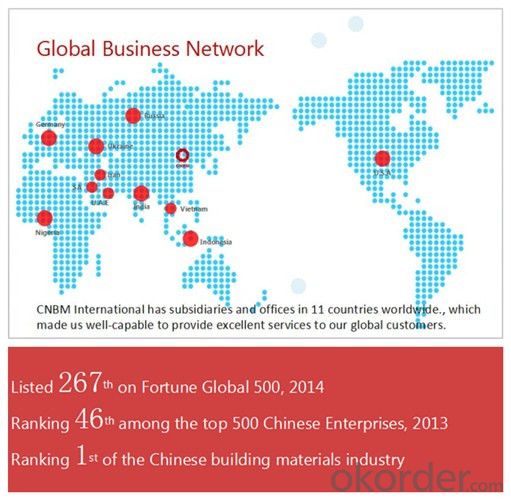
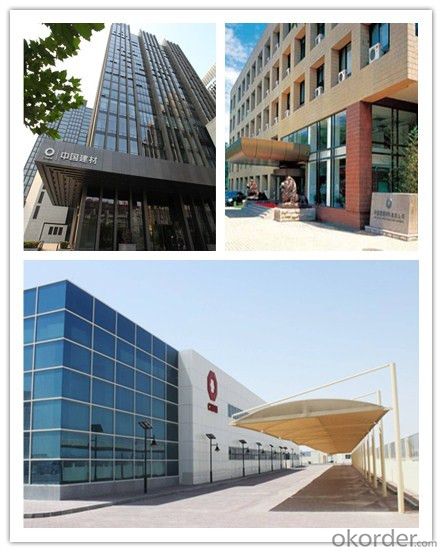
Packaging & Delivery of the Grade EN10346- DX53D+Z Galvanized Steel Coil
Packaging Detail | Sea worthy packing /as per customer's packing instruction |
Delivery Detail | 15 ~ 40 days after receiving the deposit |
Products Show:
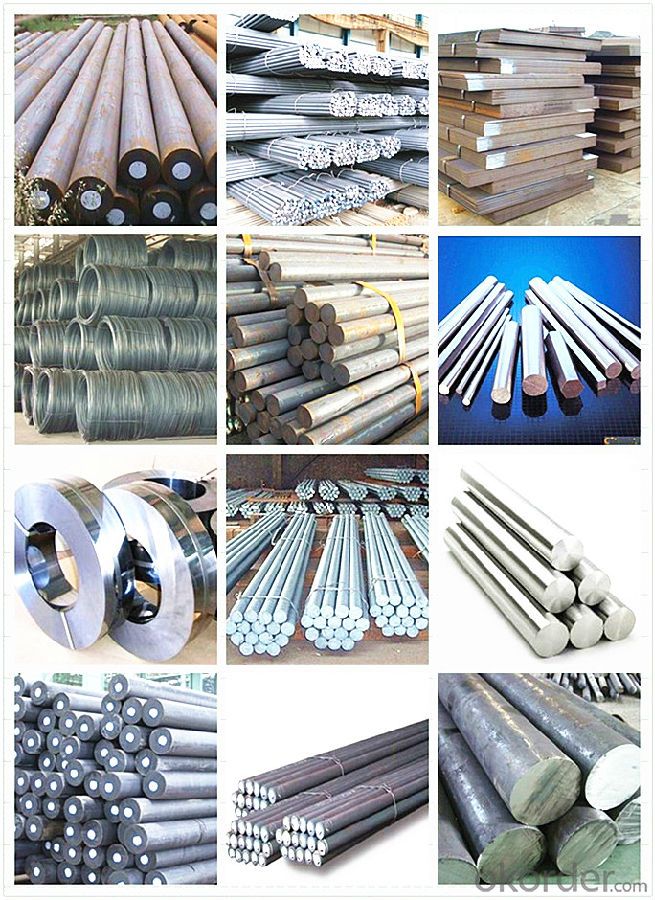
FAQ:
Are you a trading company or manufacturer? | Manufacturer |
What’s the MOQ? | 3 metric ton |
What’s your delivery time? | 15-35 days after downpayment received |
Do you Accept OEM service? | Yes |
what’s your delivery terms? | FOB/CFR/CIF |
What's the Payment Terms? | 30% as deposit,70% before shipment by T/T |
Western Union acceptable for small amount. | |
L/C acceptable for large amount. | |
Scrow ,Paybal,Alipay are also ok | |
Why choose us? | Chose happens because of quality, then price, We can give you both. Additionally, we can also offer professional products inquiry, products knowledge train (for agents), smooth goods delivery, excellent customer solution proposals. |
What's your available port of Shipment? | Main Port, China |
What’s your featured services? | Our service formula: good quality+ good price+ good service=customer's trust
|
Where are your Market? | Covering more than 160 countries in the world |
- Q: What is the significance of carbon content in special steel?
- The carbon content in special steel is significant as it determines the steel's strength, hardness, and overall performance. Higher carbon content usually results in increased hardness and strength, making it suitable for applications that require high durability and resistance to wear. On the other hand, lower carbon content enhances the steel's ductility and ease of machining. The right balance of carbon content in special steel allows manufacturers to tailor the material to specific needs, ensuring optimal performance in various industries such as automotive, aerospace, and construction.
- Q: How are titanium alloys used in the medical industry?
- Titanium alloys are widely used in the medical industry due to their excellent biocompatibility, corrosion resistance, and high strength-to-weight ratio. These alloys are used for various medical applications such as implants, surgical instruments, and medical equipment. They are often used in orthopedic implants, dental implants, and cardiovascular devices, as they provide long-term stability and compatibility with the human body. Additionally, titanium alloys are highly resistant to bodily fluids and can withstand harsh sterilization processes, making them ideal for use in the medical field.
- Q: How is special steel machined?
- Special steel is machined using various techniques such as turning, milling, drilling, grinding, and cutting. These processes involve using specialized tools and equipment to shape and remove material from the steel, ensuring precise dimensions and smooth finishes. Additionally, advanced technologies like computer numerical control (CNC) machines are often used to automate the machining process, resulting in higher efficiency and accuracy.
- Q: What are the main factors affecting the corrosion resistance of special steel?
- The corrosion resistance of special steel can be influenced by several key factors. To begin with, the composition of the steel is pivotal in determining its ability to resist corrosion. Special steels often contain alloying elements like chromium, nickel, and molybdenum, which create a protective oxide layer on the steel's surface. This layer acts as a barrier, preventing corrosive substances from reaching the steel and causing damage. The higher the percentage of these alloying elements, the stronger the corrosion resistance of the steel. Another significant factor is the presence of impurities or contaminants in the steel. Impurities like sulfur or phosphorous can compromise the protective oxide layer, making the steel more vulnerable to corrosion. Therefore, it is crucial to ensure the purity of the steel and implement appropriate manufacturing processes to maintain good corrosion resistance. The surface finish of the steel also plays a role in its corrosion resistance. A smooth and polished surface minimizes the areas where corrosive substances can gather and penetrate the steel, thereby reducing the chances of corrosion. Surface treatments like passivation or coating can further enhance the corrosion resistance of special steel. Moreover, the environment in which the steel is exposed is a critical factor. Different environments contain varying levels of corrosive substances such as moisture, acids, or salts, which can accelerate the corrosion process. Marine environments, for example, with their high salt content, are particularly corrosive and demand special steel grades with superior resistance to such conditions. Finally, the operating temperature of the steel can impact its corrosion resistance. Certain special steels, like stainless steel, exhibit excellent resistance to corrosion at elevated temperatures, making them suitable for high-temperature applications where other materials may corrode. To summarize, the corrosion resistance of special steel is influenced by factors such as composition, impurities, surface finish, environment, and operating temperature. By considering these factors and selecting the appropriate steel grade, one can ensure optimal corrosion resistance for specific applications.
- Q: What are the main characteristics of electrical steel?
- Electrical steel, also known as silicon steel or transformer steel, offers several key features that make it suitable for use in electrical appliances and power equipment. Firstly, it possesses a high magnetic permeability, enabling efficient magnetic flux conduction and reducing energy losses in transformers, motors, and generators. Secondly, electrical steel demonstrates low core loss, encompassing hysteresis loss and eddy current loss. Hysteresis loss refers to the dissipation of energy caused by the reversal of magnetic domains within the material, while eddy current loss arises from circulating currents induced by alternating magnetic fields. The low core loss property of electrical steel ensures high energy efficiency and minimizes heat generation in electrical devices. Another significant characteristic of electrical steel is its high electrical resistivity, which diminishes the magnitude of eddy currents and further reduces energy losses in electrical equipment. Additionally, it possesses a high saturation induction, denoting its ability to reach maximum magnetic flux density. This characteristic enables transformers and motors to function at higher magnetic flux densities, resulting in more compact and efficient designs. Moreover, electrical steel exhibits high mechanical strength, essential for withstanding the stresses and vibrations encountered in electrical devices. It also demonstrates good thermal conductivity, facilitating efficient heat dissipation and enhancing the overall performance and longevity of electrical equipment. In conclusion, electrical steel boasts high magnetic permeability, low core loss, high electrical resistivity, high saturation induction, high mechanical strength, and good thermal conductivity. These properties make it an ideal material for various electrical applications, offering efficiency, reliability, and performance in power generation, transmission, and utilization.
- Q: What is the role of boron in special steel alloys?
- Boron plays a crucial role in special steel alloys by enhancing their hardenability, which is the ability of the steel to be hardened through heat treatment. It acts as a grain refiner, allowing for a finer and more uniform microstructure in the steel, resulting in improved mechanical properties such as increased strength and toughness. Additionally, boron helps to prevent the formation of harmful oxides during steel production, leading to improved overall quality and performance of the alloy.
- Q: How does special steel contribute to the mining industry?
- Special steel contributes to the mining industry by offering enhanced durability, high strength, and resistance to extreme conditions. It is used in various mining equipment and machinery, such as drills, excavators, and crushers, to withstand the harsh environment and increase efficiency. Additionally, special steel alloys with specific properties are utilized in mining processes like ore extraction and mineral processing, ensuring optimum performance and reducing downtime.
- Q: What is the impact of high temperature on the mechanical properties of special steel?
- High temperature has a significant impact on the mechanical properties of special steel. When exposed to high temperatures, special steel may undergo a phenomenon called thermal softening, where its mechanical strength decreases. This is primarily due to the reduction in the material's yield strength and hardness at elevated temperatures. One of the key effects of high temperature on special steel is the reduction in its ability to resist deformation. At elevated temperatures, the steel becomes more ductile, meaning it is more prone to elongation and plastic deformation. This increase in ductility can result in a decrease in the material's ability to maintain its shape and integrity under load, which can lead to distortion, warping, or even failure of the component. Furthermore, high temperatures can also cause changes in the microstructure of special steel. For instance, prolonged exposure to elevated temperatures can lead to the formation and growth of grain boundaries, which can weaken the material's mechanical properties. Additionally, high temperature can promote the diffusion of impurities or alloying elements within the steel, altering its chemical composition and potentially affecting its mechanical behavior. Another consequence of high temperature on special steel is the reduction in its resistance to corrosion and oxidation. At elevated temperatures, the steel is more susceptible to oxidation, which can result in the formation of scales or even complete material degradation. This can compromise the steel's mechanical properties, such as its strength and toughness. In conclusion, high temperature has a detrimental impact on the mechanical properties of special steel. It reduces the material's strength, increases its ductility, alters its microstructure, and decreases its resistance to corrosion and oxidation. Therefore, it is crucial to consider the effects of high temperature when designing and selecting special steel for applications that involve exposure to elevated temperatures.
- Q: What are the challenges in working with special steel?
- When it comes to working with special steel, there are several distinct challenges that set it apart from regular steel. Let's take a look at some of the main difficulties one might encounter in this field: 1. Expensive nature: Special steels often come with higher production costs due to their unique composition and properties. The raw materials used in their production may be scarce or require intricate manufacturing processes, resulting in increased expenses. 2. Limited availability: Special steels are not as readily accessible as regular steels, making it more arduous to source them. This limited availability can lead to longer lead times and potentially higher costs when attempting to obtain the necessary materials. 3. Machining complexity: Special steels can prove challenging to machine due to their elevated hardness or toughness. Their distinctive properties may cause excessive tool wear, resulting in increased machining time and costs. Overcoming these challenges may necessitate the use of specialized cutting tools and machining techniques. 4. Heat treatment requirements: Achieving the desired mechanical properties of special steels often demands precise and specific heat treatment processes. The complexity of heat treatment lies in the careful control of temperature, time, and cooling rates. Improper heat treatment can result in inconsistent material properties or even material failure. 5. Welding difficulties: In comparison to regular steels, certain special steels may exhibit poor weldability. They may be prone to cracking or require preheating and post-weld heat treatment to ensure proper joint integrity. This can introduce complexity and cost to welding processes. 6. Corrosion susceptibility: While special steels may possess excellent mechanical properties, they can sometimes be more vulnerable to corrosion when compared to regular steels. This necessitates additional measures to protect the steel from corrosion, such as applying protective coatings or utilizing corrosion-resistant alloys. 7. Knowledge and expertise requirements: Working with special steels typically demands a higher level of technical knowledge and expertise. The unique properties and characteristics of these materials necessitate a deep understanding of their behavior and effective handling. This may call for specialized training or collaboration with experts in the field. Despite these challenges, working with special steel also offers various benefits, including superior strength, durability, and performance in specific applications. By comprehending and addressing these challenges, engineers and manufacturers can leverage the unique properties of special steel to develop innovative and high-quality products.
- Q: Can special steel be used in the musical instrument manufacturing industry?
- Yes, special steel can be used in the musical instrument manufacturing industry. It can be utilized for various components of musical instruments, such as strings, keys, and structural parts, to enhance durability, tone quality, and overall performance.
Send your message to us
Grade EN10346- DX53D+Z Galvanized Steel Coil
- Loading Port:
- Tianjin
- Payment Terms:
- TT OR LC
- Min Order Qty:
- 3 m.t.
- Supply Capability:
- 10000 m.t./month
OKorder Service Pledge
OKorder Financial Service
Similar products
Hot products
Hot Searches
Related keywords
